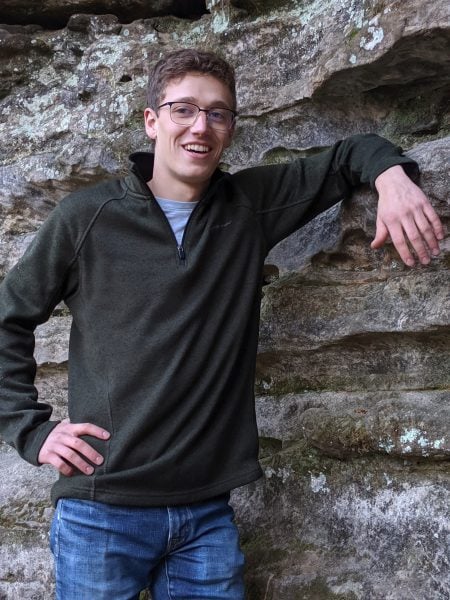It’s beginning to look a lot like . . . mid-year commencement here at Michigan Tech! As we wind down the semester and wind up the excitement, lets find out what’s next for our most recent accelerated masters student, Matt Chard, in this Q&A spotlight.
Matt earned the degree Bachelor in Management Information Systems (MIS) from Michigan Tech in fall 2021. The following semester he continued his studies with the accelerated masters program in Applied Cognitive Science and Human Factors (ACSHF). One year later, Matt will graduate with a masters degree in ACSHF and begin his career as a Human Factors Engineer with Pacific Science & Engineering in San Diego, CA.
Q: As a MIS undergrad, what attracted you to the ACSHF masters program?
A: As part of my MIS degree, I had a user-centered design class where I first learned about UX/human factors and the class left me wanting more. After hearing about the ACSHF program, it was clearly the right direction for me. I was hooked.
Q: What advantages do you feel you have gained from adding an ACSHF accelerated masters to your business degree?
A: My MIS undergraduate program taught me how to develop and maintain technical systems, which was a great starting point to then learn the scientific basis and human factor tools in the ACSHF program. The combination of degrees and skills learned are needed to inform complex human machine interface solutions, which is what I will be doing for my job at Pacific Science and Engineering after I graduate.
Q: To give us a better idea of what information and skill set someone obtains from adding an accelerated masters in ACSHF to their undergrad degree, what type of courses did you complete during your additional year in the program?
A: A combination of several classes such as the human factors specific courses, and the applied cognitive science course taught me the fundamental science and research. For example, learning about working memory capacity will be useful when designing a system that requires a user to manage several tasks at once. On the other hand, courses such as the cognitive task analysis class taught me about the tools and methods needed to solve problems.
Q: Were you able to take advantage of any internships or co-ops during your time at Michigan Tech? If so, can you tell us a bit about them?
A: Yes! During my undergraduate degree I interned at several companies, and I was mostly working on systems within manufacturing settings. My most recent internship was my first professional experience in the human factors field, and it was a big change of pace for me. Though I was always focused on designing user friendly systems in previous internships, I am now able to use human factors tools combined with scientific based evidence to inform my decisions around user needs, which is what human factors is all about.
Q: What new opportunities and/or adventures are you looking forward to in your move to the west coast?
A: I am excited to take advantage of the year around sunshine in San Diego by getting out to surf and rock climbing. Though, I will miss being able to sneak in a ski right before class in Houghton.
Q: Anything else you’d like to share with a prospective undergraduate or graduate student considering a degree in Applied Psychology and Human Factors at Michigan Tech?
A: It can be difficult to conceptualize what a human factors expert may actually do day-to-day in the real world. I would encourage anyone who is considering the program to reach out to the faculty to learn from their diverse backgrounds. You might be surprised to hear about all the opportunities out there, and you might also discover the program to be a great match, as it was for me!
CLS congratulates Matt and wishes him all the best in his new position at PSE!
Pacific Science and Engineering mission: The majority of accidents, particularly major accidents, are attributed to human error. Those errors are almost always due to bad design. Pacific Science & Engineering (PSE) exists to create science-driven human-machine interfaces that allow humans to safely and effectively operate high consequence and high complexity systems. Function drives form, always.
#humanfactors, #humancentereddesign
Michigan Tech’s Department of Cognitive and Learning Sciences offers bachelor of science degrees in Psychology and Human Factors, along with a Minor in Psychology. We also offer an Accelerated Masters degree in Applied Cognitive Science and Human Factors (ACSHF), which typically requires only one additional year of course work. Our graduate program includes masters and doctoral degrees in Applied Cognitive Science and Human Factors (ACSHF).
Questions? Contact us at cls@mtu.edu. And follow us @clsmtu on Instagram and Facebook for the latest happenings.
